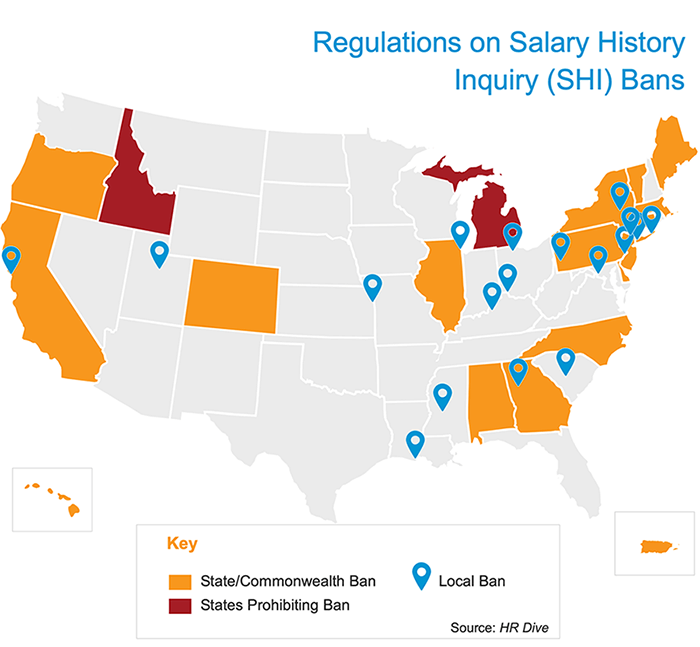The Salary History Ban: What Employers Need to Know

To address the gender and racial wage gap, cities, states and territories around the U.S. are banning employers from asking for a job candidate's pay history. The bans have important implications for employers in a jurisdiction that is instituting or considering a version of the ban.
State and local legislators are enacting Salary History Inquiry (SHI) bans to address ongoing pay inequality on the basis of gender, race and other protected categories in an effort to prevent further perpetuation of the same via questions about the salary histories of prospective employees. Many of these bans are specifically designed to combat what lawmakers view as gender- and minority-based pay inequities that may otherwise continue over the course of a worker’s career.
“Some laws go further than merely banning pay history questions,” notes HR Dive. “A few also prohibit an employer from relying on an applicant's pay history to set compensation if discovered or volunteered; others prohibit an employer from taking disciplinary action against employees who discuss pay with coworkers.”

Banning the ban
At the same time, Michigan and Wisconsin have bucked the trend, passing legislation that prohibits localities from instituting salary history bans. However, in 2019, new Michigan Governor Gretchen Whitmer put some parameters around the law, signing an executive order prohibiting state departments’ ability to “(a) Inquire about a job applicant’s current or previous salaries unless and until the department or agency first makes a conditional offer of employment, including an explanation of proposed compensation and (b) make inquiry of a current or prior employer or search public records databases to ascertain an applicant’s current or previous salary.”
How do employers know how much to offer?
Employers in the jurisdictions that have banned salary history questions may have lost a tool they relied on to help to determine what to offer candidates. But there are other ways to determine appropriate pay, according to Meredith Lurty, an Aerotek strategic account executive who specializes in recruiting high-demand engineers.
“It’s really important in our business to maintain a pulse on the market, especially in this candidate-driven hiring landscape,” she says. “Employers need hard data in order to make the best decisions,” Lurty says, including information on:
- Local market conditions
- Employers competing for the same talent and their pay rates
- Economic indicators and industry trends
As an example, knowing local market conditions is particularly useful in larger companies where the high-level human resources or decision-making staff might be based in a different market and less knowledgeable about local hiring norms. Sometimes, hiring managers need to make the case to leadership that explains why a higher pay rate might be needed to secure the preferred candidates.
“Most job candidates have at least a few offers, so there can be a huge opportunity cost to making an offer that’s too low,” Lurty says “And it’s not just salary, it’s total compensation. Candidates are increasingly asking for additional benefits such as holidays and other paid time off [PTO].”
Potential pitfalls
Multi-offer situations also mean that employers need to have a sense of urgency around hiring decisions. “A long process, or one in which the hiring manager does not seem empowered as the decision-maker, can cause an employer to lose out on great candidates.”
Best practices in SHI adherence
There are specific steps can be taken by recruiters, human resources professionals and hiring managers operating in jurisdictions with SHI Bans.
- Review existing recruiting and onboarding policies, practices and procedures to ensure compliance.
- Review existing job applications to ensure those documents do not contain any requests for applicants to disclose their salary histories during the hiring process.
- Train and/or provide information to recruiters and other personnel involved in interviewing and onboarding to ensure they are not asking (or otherwise prompting) candidates to disclose salary history. Recruiters should be trained to focus on an applicant’s salary requirements and expectations versus salary history, emphasizing that the company sets pay commensurate with experience.
- Refrain from any conduct which could be construed as a refusal to hire an applicant based upon his or her failure to provide salary history (to avoid any claims of retaliation).
Knowing what to offer a job candidate isn’t always easy and getting it wrong can mean an unpalatable choice between overpaying and losing a great potential employee. Having a deep understanding of local market dynamics — or working with a recruitment partner with that expertise — can help replace salary history in helping to determine an appropriate offer.
Want to learn more about salary history bans and determining market rate compensation? Contact Aerotek now.
